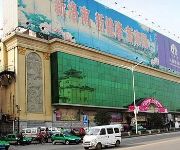Facts and Data
Webpages:
Official Unesco Page
Basis Data:
Unesco World heritage since: 2014
Size of heritage: 20,819 ha
- Buffer zone: 53,320 ha
Coordinates:
Longitude: 112,468°
Latitude: 34,694°
Summary
The Grand Canal is a vast waterway system in the north-eastern and central-eastern plains of China, running from Beijing in the north to Zhejiang province in the south. Constructed in sections from the 5th century BC onwards, it was conceived as a unified means of communication for the Empire for the first time in the 7th century AD (Sui dynasty). This led to a series of gigantic construction sites, creating the world’s largest and most extensive civil engineering project prior to the Industrial Revolution. It formed the backbone of the Empire’s inland communication system, transporting grain and strategic raw materials, and supplying rice to feed the population. By the 13th century it consisted of more than 2,000 km of artificial waterways, linking five of China’s main river basins. It has played an important role in ensuring the country’s economic prosperity and stability and is still in use today as a major means of communication.
Location on Map
Show bigger map on Openstreetmap
The Grand Canal: A UNESCO World Heritage Site in China
The Grand Canal, located in China, is a remarkable UNESCO World Heritage site that spans over 1,700 kilometers, making it the longest and oldest artificial waterway in the world. With its rich history and cultural significance, the Grand Canal has played a vital role in shaping China's economic and social development for over 1,400 years.
Historical Significance
The construction of the Grand Canal began during the Sui Dynasty in the 5th century, under the reign of Emperor Yangdi. The canal was initially built to connect the Yellow River and the Yangtze River, two of China's major waterways, in order to facilitate transportation and trade between the northern and southern regions of the country.
Throughout the centuries, the Grand Canal underwent several expansions and renovations, particularly during the Yuan, Ming, and Qing dynasties. These improvements not only extended the canal's reach but also enhanced its functionality, making it an essential artery for the transportation of goods, agricultural produce, and people.
Moreover, the Grand Canal played a crucial role in the cultural exchange between different regions of China. It facilitated the spread of ideas, religions, and artistic traditions, contributing to the development of a unified Chinese culture.
Current State
Today, the Grand Canal remains a vital waterway, serving as an important transportation route for both commercial and recreational purposes. It connects several major cities, including Beijing, Tianjin, and Hangzhou, and passes through numerous provinces, such as Shandong, Jiangsu, and Zhejiang.
The canal's current state reflects its historical significance and the efforts made to preserve its cultural heritage. The UNESCO World Heritage designation has played a crucial role in raising awareness about the importance of the Grand Canal and promoting its conservation.
Various preservation projects have been undertaken to protect and restore the canal's infrastructure, including locks, bridges, and ancient water towns. These efforts aim to maintain the authenticity and integrity of the site while ensuring its sustainable use for future generations.
Furthermore, the Grand Canal has become a popular tourist destination, attracting visitors from around the world. Traveling along the canal by boat or exploring its picturesque surroundings on foot allows visitors to immerse themselves in the rich history and cultural heritage of China.
The Grand Canal's significance extends beyond its historical and cultural value. It also serves as an important water resource, providing irrigation for agricultural lands and supporting local ecosystems.
Conclusion
The Grand Canal in China stands as a testament to the ingenuity and engineering prowess of ancient civilizations. Its historical significance, cultural impact, and current state as a UNESCO World Heritage site make it a remarkable destination for those seeking to explore China's rich heritage. As efforts continue to preserve and protect this extraordinary waterway, the Grand Canal will undoubtedly continue to play a vital role in China's cultural and economic landscape.
Hotels and places to stay
Joysion International Hotel Luoyang
Atour Hotel Luoyang Mingtang
Kaifute Hotel Zhouwangcheng Plaza
Bajie Youth Hostel
New Jianlong Hotel - Luoyang
New Jianlong
Yijia Youth Hostel
Home Inn Tanggong Middle Road - Luoyang
Zhongzhou Hotel Jinguyuan - Luoyang
Tianxiang Hotel - Luoyang
Videos from the area
Videos provided by Youtube are under the copyright of their owners.












